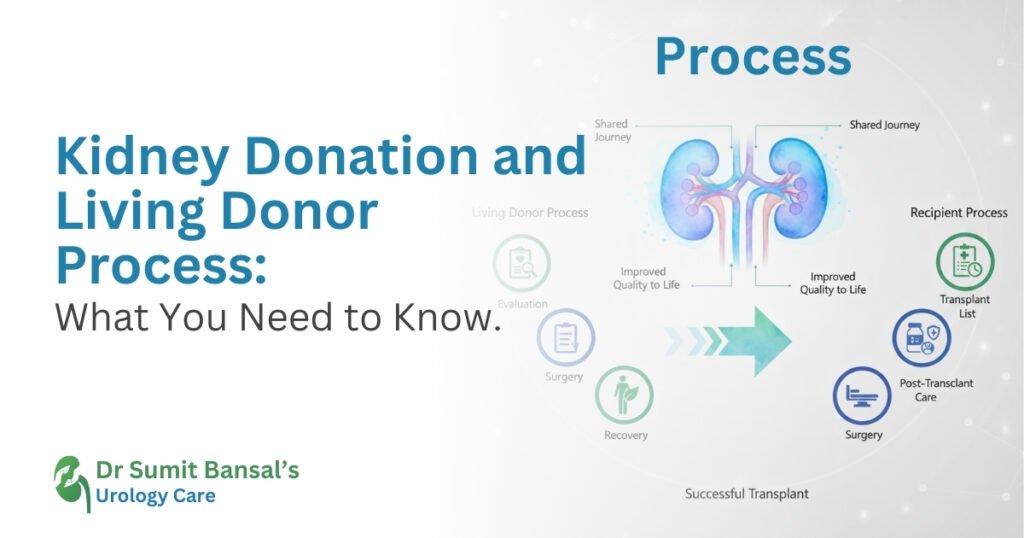Kidney donation is one of the most selfless acts a person can do, offering someone suffering from end-stage kidney disease a chance at a healthier and longer life. With kidney transplants being one of the most successful organ transplant procedures, living kidney donation has become increasingly common. In this blog, we’ll walk you through everything you need to know about the kidney donation process and how living donors make a life-changing difference.
Why Kidney Donation Matters
Chronic kidney disease (CKD) affects millions worldwide, and many patients eventually require dialysis or a kidney transplant. Unfortunately, the demand for kidneys far outweighs the supply, leaving thousands waiting for years.
A living donor kidney transplant can reduce waiting time, improve transplant success rates, and provide patients with a healthier organ compared to deceased donor kidneys.
Who Can Be a Living Kidney Donor?
Not everyone is eligible to donate a kidney. Potential donors undergo thorough medical and psychological evaluations to ensure safety for both the donor and the recipient.
Basic requirements include:
Age between 18 and 65 years
Good physical and mental health
Normal kidney function and no chronic diseases (like diabetes, uncontrolled hypertension, or active infections)
Willingness to donate without pressure or financial incentive
Family members (siblings, parents, or children) are often preferred donors due to a higher chance of compatibility. However, non-related donors can also be considered if medically suitable.
The Living Donor Evaluation Process
The evaluation ensures that the donor is healthy enough to live with one kidney and that the kidney is suitable for the recipient. The process includes:
Medical History & Physical Examination – Checking overall health, past illnesses, and current fitness.
Blood Tests – To determine blood type and tissue compatibility.
Kidney Function Tests – To assess how well the kidneys are working.
Imaging Tests – Such as CT scans or ultrasounds to examine kidney anatomy.
Psychological Assessment – To ensure the donor is emotionally prepared.
The Kidney Donation Surgery
Living kidney donation is usually performed through laparoscopic surgery (minimally invasive technique), which involves small incisions and faster recovery compared to traditional open surgery.
What to expect:
Surgery typically lasts 3–4 hours.
Donors stay in the hospital for 3–5 days.
Recovery time is usually 4–6 weeks before returning to normal activities.
Life After Kidney Donation
Most living donors continue to live healthy, active lives with one kidney. Regular check-ups are recommended to monitor kidney function. Studies show that life expectancy and overall health remain almost the same as those with two kidneys.
Tips for long-term health after donation:
Maintain a balanced diet and healthy lifestyle.
Avoid excessive use of painkillers or kidney-damaging medications.
Stay hydrated and exercise regularly.
Attend regular follow-up checkups.
Risks and Considerations
While kidney donation is generally safe, as with any surgery, there are potential risks such as bleeding, infection, or reaction to anesthesia. Long-term risks are rare but may include slightly higher chances of developing high blood pressure or kidney problems. That’s why careful screening and lifelong monitoring are essential.
Dr. Sumit Bansal: Expertise in Kidney Transplants
If you or a loved one is considering kidney donation or undergoing a kidney transplant, it’s crucial to consult an experienced specialist. Dr. Sumit Bansal, a leading Minimal Access Urologist, Uro-Oncosurgeon, and Kidney Transplant Surgeon at Manipal Hospital, Gurugram and Dwarka, has extensive experience in living donor kidney transplantation. His expertise ensures patient safety, advanced surgical techniques, and comprehensive care for both donors and recipients.
📞 To know more or book a consultation with Dr. Sumit Bansal, call +91 9599 555 945.



